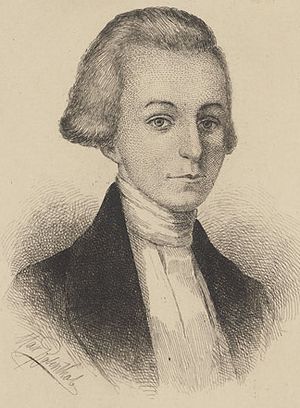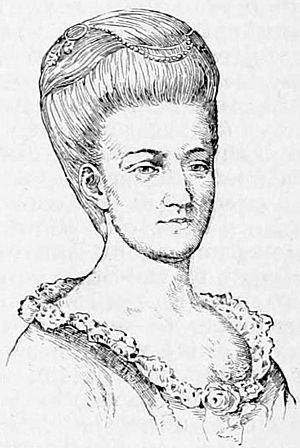William Duer (Continental congressman) facts for kids
Quick facts for kids
William Duer
|
|
|---|---|

Etching of William Duer by Max Rosenthal
|
|
| 1st Assistant Secretary of the Treasury | |
| In office 1789–1792 |
|
| Member of the Continental Congress |
|
| In office 1778–1779 |
|
| Preceded by | Inaugural holder |
| Succeeded by | Ebenezer Russell |
| Member of the New York State Senate for the Eastern District | |
| In office September 9, 1777 – June 30, 1778 |
|
| Member of the Provincial Congress |
|
| In office 1775–1775 |
|
| Personal details | |
| Born | March 18, 1743 Devon, Great Britain |
| Died | May 7, 1799 (aged 56) New York City, New York, U.S. |
| Political party | Federalist |
| Spouses |
Catherine Alexander
(m. 1779; |
| Relations | William Duer (grandson) |
| Children | 8, including William, John |
| Parents | John Duer Frances Frye |
| Education | Eton College |
William Duer (born March 18, 1743 – died May 7, 1799) was an important figure in early American history. He was born in Britain but became an American lawyer and businessman in New York City. As a member of the Federalist Party, Duer supported the new United States Constitution. He even wrote articles using the pen name "Philo-Publius" to convince people to approve it.
Before this, he served in the Continental Congress and helped create the New York Constitution. In 1778, he signed the Articles of Confederation, which was the first agreement among the 13 original states. Many consider him one of the Founding Fathers of the United States.
Contents
Early Life and Education
William Duer was born in Devon, Great Britain, in 1743. His father, John Duer, owned plantations in Antigua in the West Indies. His mother, Frances Frye, was the daughter of Sir Frederick Frye, a military commander in the West Indies.
Duer went to Eton College, a famous school in England. When he was still young, he joined the army as an ensign. He traveled to India in 1762 as an assistant to Robert Clive, who was a governor there. However, the climate made him sick, so he returned to England. He stayed there for five years until his father passed away, and he inherited his father's properties in Dominica.
Career and Business Ventures
After leaving the army, Duer went to Antigua. In 1768, he visited New York State for the first time. He wanted to find a steady supply of wood for his plantations in Antigua and Dominica. He was a planter, meaning he managed farms that grew crops. He traded a lot with Philip Schuyler, a well-known American general and politician. Schuyler convinced Duer to move to New York in the early 1770s.
Duer had already bought land near Albany on the Hudson River. This area, called Fort Miller, became his first home and the start of his business ventures. He built sawmills, warehouses, and a store there.
In 1773, he went back to England and got a contract to supply the Royal Navy with timber for ship masts. By 1776, he had built a successful business mainly focused on producing lumber.
Role in the American Revolution
At first, William Duer was a moderate Whig. This meant he was somewhat hesitant to actively fight against the British government. However, he soon became more involved.
- He joined the Provincial Congress in 1775.
- He was part of the committee that wrote the first New York Constitution in 1776.
- From 1777 to 1778, he served in the New York State Senate.
- He was a member of the Continental Congress in 1778 and 1779.
While in Congress, Duer made a good impression on important figures like future president John Adams and financier Robert Morris. He worked with them on committees related to finance and war.
In 1779, Duer returned to his private businesses. He partnered with John Holker, a French business agent. He also made money by supplying goods to the American army through contracts arranged by Robert Morris.
Later Business and Challenges
After the American Revolutionary War, Duer became involved in large business deals. He was also elected to the New York General Assembly in 1786. When Alexander Hamilton became the first Secretary of the Treasury in 1789, Duer was appointed the first Assistant Secretary.
Duer continued to be involved in many business ventures. However, some of his large-scale investments ran into serious trouble. This led to a financial crisis in 1792, which affected many people in New York. As a result, Duer faced major financial difficulties and was held in a debtors' prison for the rest of his life.
Family Life
In 1779, William Duer married Lady Catherine Alexander (1755–1826). She was the daughter of General William Alexander, a major general in the Continental Army during the American Revolutionary War. Their wedding took place at her family's country home in New Jersey. Catherine came from important families in New York, including the Livingstons and Schuylers.
William and Catherine had eight children together:
- William Alexander Duer (1780–1858): He became a judge and later the President of Columbia University.
- John Duer (1782–1858): He was a well-known lawyer and judge in New York.
- Frances Duer (1786–1869)
- Sarah Henrietta Duer (born 1787)
- Catherine Alexander Duer (1788–1882)
- Maria Theodora Duer (1789–1837)
- Henrietta Elizabeth Duer (1790–1839)
- Alexander Duer (1793–1819)
William Duer passed away in New York City on May 7, 1799, at the age of 56. He was first buried in a family tomb and later reinterred in Jamaica, Long Island, New York.
Notable Descendants
William Duer's family continued to be important in American society.
- His grandson, also named William Duer (1805–1879), served in the U.S. Congress representing New York.
- His great-great-granddaughter was Alice Duer Miller (1874–1942), a famous feminist poet and writer.
 | James Van Der Zee |
 | Alma Thomas |
 | Ellis Wilson |
 | Margaret Taylor-Burroughs |


